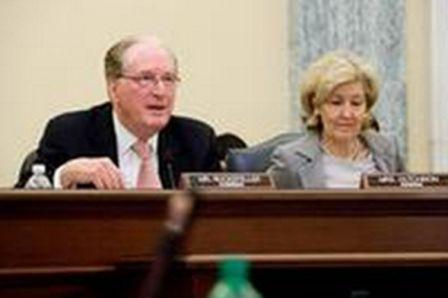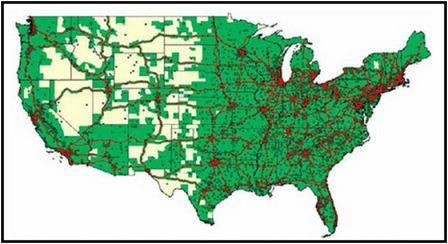Cable Technology Feature Article
FCC TV Spectrum Reallocation: Win-Win Plan?
 By Barlow Keener, Attorney
By Barlow Keener, Attorney
Starting in 1996, the FCC (News - Alert) began the work of moving TV broadcasters from analog to digital TV. At the time, it was anticipated that TV stations would use their spectrum to deliver additional, unspecified non-broadcast- type services.
In 1998, the FCC prescribed a rule (47 CFR 73.624(g)), following the 1996 Telecom Act, allowing TV stations to offer such supplementary and ancillary services, and requiring broadcasters to pay 5 percent of the revenues from these services to the Treasury, as compensation to the public for these additional uses.
Now, 15 years later, the FCC and Congress are proposing to relocate the TV stations by “repacking” them together on different channels, preventing them from taking advantage of this flexible use specifically authorized by the 1996 Act, including using broadcast spectrum to provide broadband services.
 Last year, on Nov. 30, 2010, the Commission issued a notice of proposed rulemaking to allow TV stations to voluntarily “repackage” to new channels, combining two TV stations onto a single channel. The order did not propose selling off White Spaces spectrum. But the order proposed selling the vacated TV spectrum using an incentive auction and delivering an unspecified amount from the auction proceeds to the TV stations that voluntarily move, with the balance to the Treasury. Marty Stern from K&L Gates discussed the order and the rights of TV broadcasters and white space providers in detail at the 4GWE White Spaces session in Miami in February 2011.
Last year, on Nov. 30, 2010, the Commission issued a notice of proposed rulemaking to allow TV stations to voluntarily “repackage” to new channels, combining two TV stations onto a single channel. The order did not propose selling off White Spaces spectrum. But the order proposed selling the vacated TV spectrum using an incentive auction and delivering an unspecified amount from the auction proceeds to the TV stations that voluntarily move, with the balance to the Treasury. Marty Stern from K&L Gates discussed the order and the rights of TV broadcasters and white space providers in detail at the 4GWE White Spaces session in Miami in February 2011.
FCC Chairman Genachowski described the value of the TV station spectrum that could be voluntarily returned by broadcasters and then resold to a cell phone provider:
The roughly 300 MHz of spectrum in the TV bands is among the most robust available. Beachfront property.
The incentive auction, proposed by the FCC, is said to potentially make 84-120 MHz available for new broadband uses. TV broadcasters worry that “voluntary” repacking will not be voluntary once it starts as Robert Good of WGAL-TV testified on April 12, 2011 at the House Energy and Commerce Committee. See Broadcasting & Cable. TV broadcasters that are repacked (two stations into 1 6MHz channel) will lose their ability to sell or use their full 6MHz of beachfront spectrum for broadband services, a right they have now.
In the last several weeks, multiple bills, substitutions, and amendments have been proposed both in the House and Senate regarding repacking: Senators Lieberman-McCain, Senators Rockefeller-Hutchison (S.911), Sen. DeMint (R., S.C.), Sen. Toomey (R., Pa.) Sen. Rubio (R., Fla.), Sen. Blunt (R., Mo.) , Sen. Warner (D., Va.), Sen. Wicker (R., Miss.), and Sen. Klobuchar (D., Minn.). And the House has jumped on this as well. So there is a lot of action happening in our nation’s capital with regard to moving TV stations again and selling off publically owned beach front property to the highest bidder.
There have also been recent suggestions that giving the FCC incentive auction authority may be addressed in legislation to raise the debt ceiling.
 Basically the Rockefeller-Hutchinson bill suggests that by selling off 84MHz to 120MHz of TV spectrum, $12 billion will be raised to give public safety funds for a public safety organization made up of leaders from cities, states, and federal agencies to build a nationwide public safety exclusive network. The D Block network would use two 10MHz of nationwide spectrum (758MHz-763MHz, 788MHz-793MHz), one dedicated to public safety and one for commercial use. (The D-Block was one of many blocks of spectrum set forth in the Telecom Act to be auctioned off in 2008 but failed for several reasons: a $1.3 billion minimum bid, the requirement that the winner pay an additional $500 million over 10 years to the FCC, and onerous build out terms.) See posts by Susan Crawford and Harold Feld. The cost to build a 1.2 Mbps nationwide broadband network is estimated by the FCC staff to cost $40 billion, not $14 billion originally envisioned. Selling 120 MHz of TV and White Spaces spectrum will only generate $28 billion. (FCC June 2010 Public Safety Report, p. 14)
Basically the Rockefeller-Hutchinson bill suggests that by selling off 84MHz to 120MHz of TV spectrum, $12 billion will be raised to give public safety funds for a public safety organization made up of leaders from cities, states, and federal agencies to build a nationwide public safety exclusive network. The D Block network would use two 10MHz of nationwide spectrum (758MHz-763MHz, 788MHz-793MHz), one dedicated to public safety and one for commercial use. (The D-Block was one of many blocks of spectrum set forth in the Telecom Act to be auctioned off in 2008 but failed for several reasons: a $1.3 billion minimum bid, the requirement that the winner pay an additional $500 million over 10 years to the FCC, and onerous build out terms.) See posts by Susan Crawford and Harold Feld. The cost to build a 1.2 Mbps nationwide broadband network is estimated by the FCC staff to cost $40 billion, not $14 billion originally envisioned. Selling 120 MHz of TV and White Spaces spectrum will only generate $28 billion. (FCC June 2010 Public Safety Report, p. 14)
On June 8, 2011, the Rockefeller-Hutchison bill (S. 911) was approved by the Senate Commerce Committee and is awaiting action by the full Senate. (Washington Post)
Risks of going forward with a TV repack and selling off beach front spectrum in an incentive auction are huge:
1) TV broadcasters will lose spectrum, never able to use their full 6 MHz again. Right now, TV stations are entitled under FCC rules and under the 1996 Telecom Act to use a portion of their full 6MHz channel for delivering broadband to consumers, and with minor tweaks to the FCC rules consistent with existing authority under the broadcast flexibility provision of the 1996 Act, broadcasters could also have the ability to sell rights to their spectrum to broadband providers. TV stations will once again move from their designated channels. Disruption with viewers will result as old viewers will have to hunt again for the station’s newest channel. TV broadcasters will be giving up very valuable beach front property in the form of spectrum without any commitment on what they would receive in return.
2) Public safety will not receive from an incentive auction the estimated $40 billion required to build a 1.2Mbps+ broadband network. (See Public Safety Report, p. 14, on the estimated $40 billion cost.) Public safety will not have an experienced wireless communications provider building, managing, running, and evolving a D-Block network. Devices made for the D-Block network will not be numerous and will therefore be costly – these devices are smartphones the public has been using for years. Rather than having a commercial provider running the network and paying for management, tower leases, back haul, and power, public safety, the tax payers will pay many, many millions of future operating expense dollars for the public network. Where will this necessary future operating expense come from as it is not in the budgets of public safety today? What is the likelihood that a group of law enforcement leaders representing different political view points and from numerous geographies, governmental organizations (town, county, state and federal) be able to build such a network on time?
3) Consumers will not be able to make use of the new “unlicensed” Super WiFi (News ![]() - Alert) innovations or TV stations’ broadband services. Chairman Genachowski projected that the new White Spaces would deliver “$7 billion in new economic value annually.” This additional economic value will not be realized if a TV repack bill is passed. The FCC’s White Spaces effort over the last 10 years and White Spaces innovations by U.S. businesses large and small would be also wasted. And the U.S. would take a back seat to other countries now launching White Spaces trials.
- Alert) innovations or TV stations’ broadband services. Chairman Genachowski projected that the new White Spaces would deliver “$7 billion in new economic value annually.” This additional economic value will not be realized if a TV repack bill is passed. The FCC’s White Spaces effort over the last 10 years and White Spaces innovations by U.S. businesses large and small would be also wasted. And the U.S. would take a back seat to other countries now launching White Spaces trials.
4) U.S. and the American public will give up the future rights to use public “beach front” spectrum in exchange for a few billion dollars. To put the “billions” in perspective, the total U.S. government annual budget is $3,456 billion. Spectrum (News - Alert), not roads and highways, will lead our economic and innovative growth in the future. It should not be sold off without seriously considering the negative future ramifications.

This tower is a White Spaces Trial on the Yurok Indian Reservation in Northern California Carlson Wireless Technologies equipment tested.
5. White Space Super WiFi Innovators. What was implemented last year by the FCC in the September 23, 2010 White Spaces order, will be taken away or significantly reduced. White Space innovator companies, like Google, Microsoft, Carlson, Spectrum Bridge, and others, have been spending investor dollars to develop radio and database technologies for the new unlicensed spectrum based on the FCC’s orders. Chairman Genachowski strongly supported White Spaces when it passed last September:
"Today’s focus is on unlicensed spectrum, which offers unique opportunities to innovators and entrepreneurs. … This new unlicensed spectrum will be a powerful platform for innovation. And as we’ve seen time and again, when we unleash American ingenuity, great things happen. … Today, Wi-Fi is a multi-billion industry and an essential part of the mobile ecosystem. As compared to the airwaves we released for unlicensed use in 1985, this “white spaces” spectrum is far more robust – traveling longer distances and through walls, making the potential for this unlicensed spectrum much greater. One analyst estimates white spaces applications could generate more than $7 billion in economic value annually.
What is the answer for meeting public safety’s need for a nationwide broadband network? Re-auction the D-Block. The FCC already has the rules and process in place for immediately re-auctioning the D-Block to a private-public safety provider.

**D-Block Coverage for a public-private partnership covering 93% of the population
By lowering the minimum bid and removing the $50m annual fee and other onerous provisions, bidders should flock to gaining a nationwide spectrum. The benefits are enormous:
- Public safety gets a broadband, state-of-the-art, nationwide network at no cost;
- Treasury gets the money it lost when the D-Block failed;
- Consumers get a new competitive, nationwide cellular provider;
- TV stations can stay in place and start delivering broadband services under the FCC rules;
- White Spaces is allowed to continue to innovate and deliver advanced wireless services over the unlicensed White Spaces spectrum; and,
- The U.S. does not sell “invaluable” public beach front spectrum.
Thoughtfulness is needed before selling off our public beach front spectrum. The simple, reasonable solution for public safety, for the future millions in operating expenses that will be required to be funded by Congress, for TV broadcasters losing their full assigned spectrum, for White Spaces innovators, for consumers, and for the future of U.S. spectrum, is to re-auction the D-Block.
The re-auction of the D Block will create the revenues needed by Treasury to make up for the failed 2008 auction. And the commercial-public requirements for the D Block will deliver a state-of-the-art network, built on time, and build with private investment.
Barlow Keener, attorney with Keener Law Group, writes the Law & Regulation column for TMCnet. To read more of Barlow's articles, please visit his columnist page..
Edited by Tammy Wolf



